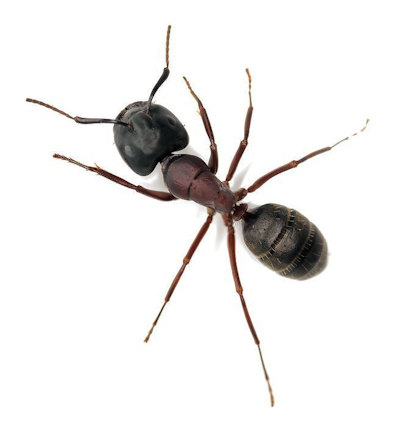There are over 1300 described ant species in Australia, and many need different treatments to control them effectively. Carpenter ants are a common yet destructive species that require professional treatment.
Our team at Jim’s Pest Control is fully trained at detecting, identifying, and treating different types of ants. Call us on 131 546 to get a free quote from your local pest expert.
How to identify carpenter ants
These ants are dark-coloured and are between 3mm and 12mm in size. They nest in moist woods, and are often found in backyard gazebos, wooden sheds, and rotting timber.
Although they are commonly known as ‘wood-eating ants’, they do not actually eat wood, but just tunnel through it. A common sign you have them in your home is a sawdust-like material called ‘frass’ which they leave near their nests.
Why are they a pest?
Carpenter ants can cause problems such as:
- House destruction: They cause wood damage in buildings and furniture, which can cause structural issues.
- Garden destruction: They enjoy the sweet secretions of plant-damaging aphids, and encourage their population.
- Bites: If threatened, they can bite you and your pets in self-defence.

Prevention and treatment
When we begin treatment, we will survey the area, and confirm the infestation. Treatment then depends on whether the colony is inside or outside, and the severity of the infestation. Treatments can include:
- Baits: Slow-acting baits are ideal for outside infestations. Foraging ants pick up the bait and carry it back to the nest, which poisons the entire colony.
- Insecticides: Non-repellent insecticides are used. Foragers will carry it back to their nests and poison the entire colony, while a perimeter treatment can help stop any outside ants entering your home.
- Dusts and foams: Insecticide dust and foam treatments can be inserted into wall cavities where the indoor nests are located to destroy the nest. This might require drilling into the wall.
Colonies take up to six years to be established, so it is very important to call a professional as soon as you notice ants in your house. Destroying the nest early will help prevent long-term damage.
To help prevent carpenter ants from nesting in your home, you can:
- Maintain your home: Keep your home in good condition. Check for any moisture issues, leaks, or problems with your plumbing which causes wood to rot.
- Maintain your lawn: Regularly trim any trees and shrubs around your home. Remove any decaying wood. Get rid of aphids, as they are a source of food.
- Seal the perimeter: Seal any cracks or openings in your house’s foundation. Check around windows, door frames, and utility pipes.
- Sanitation: Keep your house clean from crumbs and excess moisture, and seal all food containers.

